Western media’s credibility vanishes with busted fake news in pandemic
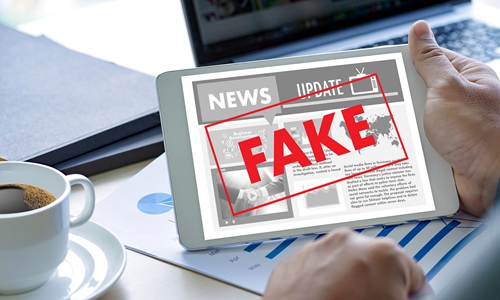
Photo: VCG
The COVID-19 pandemic has been rapidly spreading globally, causing tremendous loss. But what is spreading more easily and faster is fake news, World Health Organization WHO Director-General Tedros Adhanom Ghebreyesus said at the Munich Security Conference in February.
The fake news, together with the virus, further hurt the public. Some Western media favor the rumors against China, such as baseless allegations of covering up the outbreak and the conspiracy theory the virus was created in lab.
But once fake news is busted by science, the Western media's halo of "professionalism" and "objectivity" vanishes.
"Not all the Western media are making fake news," He Hui, a professor at School of International Journalism and Communication under Beijing Foreign Studies University, told the Global Times on Saturday. But he noted that the attack with rumors from Western media reminds him of the "black propaganda" at war time.
Lü Xiang, a research fellow on US studies at the Chinese Academy of Social Sciences in Beijing, said that these rumors with strong political connotation show the inside arrogance of the Western countries who believe that their political system is "better than China's."
What is relieving is that the situation only occurs in politics and the media currently. Scientists around the world are still keeping their conscience, Lü said.
Hyping rumors
Australia media the Daily Telegraph published an exclusive report on its front page on May 2, saying that its journalist Sharri Markson obtained a 15-page research document from the Five Eyes intelligence agencies, which revealed the novel coronavirus may "originate from the Wuhan Institute of Virology."
This report was widely quoted by international media and Markson was even invited to "reveal the truth" on Fox News. However, intelligence agencies of US and Australia quickly denied the existence of that document.
The Sydney Morning herald reported on May 4 that senior officials in Australia's intelligence community said most of the material in the Daily Telegraph's so-called secret dossier was based on news reports and without any intelligence information.
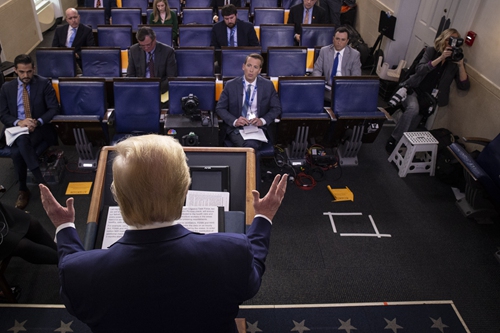
US President Donald Trump answers questions from the media during the daily briefing on the novel coronavirus, COVID-19, in the Brady Briefing Room of the White House in Washington, DC on April 21. Photo: AFP
On April 14, the Washington Post published columnist Josh Rogin's article, claiming that, according to the obtained telegraph of the US embassy in Beijing sent in January 2018, the US embassy officials paid an "unusual visit" to the Wuhan Institute of Virology, warning "the lab's study of the bat coronavirus and its possibility to human transmission, represents a new pandemic risk similar to SARS," and security of the laboratory was put forward.
However, the Grayzone, a US-based independent news outlet, researched Josh Rogin's background. Max Blumenthal, the site's founder, told the Global Times that Josh once worked at the Japanese Embassy, is one of the most important figures in the neoconservative movement who want to push the "new cold war" with China.
During this pandemic, the boring pattern of "spreading rumors, being refuted, and spreading rumors again" is not only limited to the topic of "the source of the virus." The rumors of "China concealing the truth" and "China manipulating the WHO" have filled the pages of some Western media.
Changing as they want
In fact, since the outbreak of COVID-19 occurred in China, some Western media have been in a state of excitement, but there is certain regularity in their focus. Lü shared his analysis of the "attitude" of some Western media in the past four months with the Global Times on Saturday.
"From the appearance of the virus to the lockdown of Wuhan, some Western media hyped the outbreak the same as SARS in 2003. Some Western media hyped SARS as a political virus. An American media even said that the SARS virus was "the scourge of God to China's political system." In the early days of the outbreak of COVID-19, they repeated the same lie," he said.
The second stage was the lockdown of Wuhan, which was described by some Western media as a "cruel and hurtful way to harm human rights," which lasted to February, he said.
"What impressed me most was an interview with Fox News on January 30 in which Wilbur Ross, US commerce secretary, said that the novel coronavirus epidemic in China would help speed up the return of manufacturing to the US," he told the Global Times.
Lü said that when in February the epidemic broke out in China, the Western media stayed out of the event. "The US' politicos and media even found they could benefit from it."
But when the Europe and the US entered emergency in late March, voices proliferated claiming "China has not been transparent at all by hiding the number of infections and deaths, which led to the spread of the virus globally."
"On March 30, a friend in France suddenly told me that the French TV and newspapers are all talking about 'China covering up the death toll.' Then I checked to find that the number in France was about to surpass that of China in those days," said Lü.
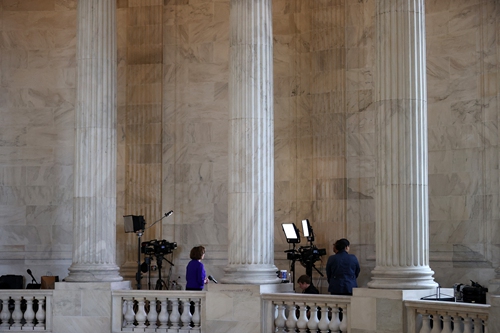
US Speaker of the House Nancy Pelosi is interviewed by CNN about the government response to the ongoing global coronavirus pandemic in the rotunda of the Russell Senate Office Building on Capitol Hill on April 1 in Washington, DC. Photo: AFP
In fact, according to the WHO on April 8, as early as on December 31, 2019, China informed the WHO that an unknown pneumonia occurred in Wuhan. Since January 3, China has been actively reporting epidemic information to the WHO, the US and other related countries and regions regularly.
China published information of the epidemic domestically and to other countries, and conducted the strictest prevention measures in shortest amount of time, winning time for other regions in the world to prepare for the pandemic.
"Talking about the origin of the virus, at the beginning Western media said it was artificial, then leaked from the Wuhan Virology Institute, or the Wuhan seafood market… whatever they said, they only have one opinion: 'the virus has definitely originated from China,'" said Lü.
The origin of a virus is not the fault of some countries. But saying it "must be from China" shows a strong politico, which we could not stand, he said.
Black propaganda
Shi Anbin, a professor at Tsinghua University's School of Journalism and Communication, said in his newly published article that in lack of "hard news" such as field report and in-depth investigation, US mainstream media adopted a politicized and emotional framework instead of a scientific and professional prospect, which distracted its people's attention from the risks of the virus.
CNN launched a highly politicized column entitled Coronavirus pandemic updates from around the world, in which it published speculation hyping up how the pandemic affected China-US relations and the international situation.
In an interview with the Global Times on Saturday, He used "black propaganda"- a term in communication - to describe the Western media's attack to China.
It has been widely accepted in the academic circles that black propaganda is typically used to vilify, embarrass, or misrepresent the enemy, which was an important psychological tactic during wartime.
Black propaganda is also seen in diplomatic activities, business negotiations, international negotiations and intelligence activities.
"The novel coronavirus and the public opinion battlefield behind the virus is a war, and it is not a surprise that some countries deem China as an enemy and some Western media to cook up stories to slander China," said He.
"Trump's intention to render China as an enemy has been obvious during the trade war between the two countries. Western media have been self-labeled as forces of 'independence' and 'integrity' as well as journalistic professionalism, but the US government's behavior of listing China as its enemy has inserted great influence on US media, making many US media fail to attain objectivity and integrity," said the expert.
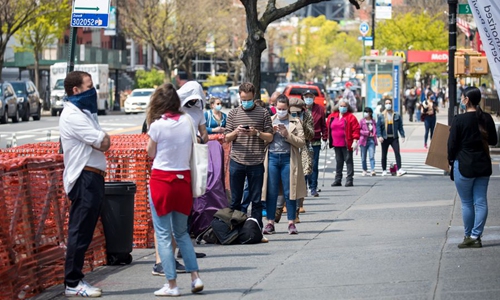
People wait in line at a New York State Department of Health COVID-19 antibody testing center at Steve's 9th Street Market in Brooklyn, New York, the United States, on April 25, 2020. (Photo by Michael Nagle/Xinhua)
"It's like being manipulated by an 'invisible hand,'" said Lü, adding that the US government has a way to manipulate its domestic media's overseas reports, and that its 'invisible hand' can even control media of its allied countries.
"A job of US Deputy National Security Advisor is to coordinate foreign media coverage on all the US governments, and we have no idea about what specific measures have been used. It's worthy to point out that the US media are independent in domestic news coverage, but they can form a concerted action in overseas news," he said.
He told the Global Times that since World War II, the US has seen a prosperous development generally. Its relatively isolated location in terms of geography makes its people care more about internal affairs, and have limited knowledge on the outside world.
"On the contrary, Chinese people know more about the US than the US people know about China as a traditional Chinese idiom said that 'To my concern are the affairs of households, country and the world,' and in the last four decades, Chinese people have been learning advanced experience from the Western countries," said He.
In fact, the public has limited knowledge on national affairs no matter in the US or other countries. Media should be responsible as media workers are elites who have more information, and if media distort the truth, the public will be biased, said Lü.
Shi echoed Lü's opinion in his article by saying that "after the novel coronavirus epidemic broke out in Wuhan, the Western media have been reporting the epidemic in China within a highly ideology-oriented framework but failed to alert the potential risks facing their own countries."
"The US has already become the center of the COVID-19 pandemic when The New York Times and The Washington Post published investigative reports on the US' lost month for testing COVID-19," Shi wrote in the article, saying it led to inestimable financial losses.
Lü was surprised by how Western media neglect China's experience. "They made a fool out of themselves this time because they were deeply convinced that the virus only affects China and would spare the Europe and the US, and it turned out too late when they felt it was time to respond to the epidemic," he said.
"No matter CNN or The New York Times, they never felt regret about the fact that they had misguided so many US people, which is essentially from their deep down pride which makes them believe that their civilization is superior to the Chinese civilization, as is their political system," said Lü.
Conscience remains
"Of course, there are also many media outlets in the Western countries holding different opinions toward Trump," He, the professor at the Beijing Foreign Studies University, said.
According to He, some media spread rumors under the Trump's administrations' influence. Meanwhile, the lack of trustful and authoritative information leads to the production of fake news - the Western media advertise freedom of speech and diversity, but there are various arguments even inside their governments, so the authority and facts are easily missing under extreme circumstances.
"Sometimes even the media are not clear what the truth is, let alone the public," He said. "Some media have produced and spread rumors when they lack sources, therefore many people felt the Western media has big problems."
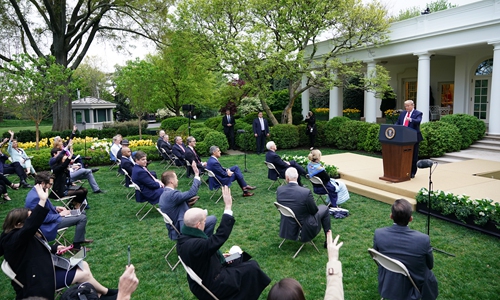
Sitting on the front row US Vice President Mike Pence and response coordinator for the White House Coronavirus Task Force Deborah Birx listen to US President Donald Trump speak during a daily briefing on COVID-19 in the Rose Garden at the White House on Tuesday in Washington DC. Photo: AFP
He said that the Western media was never apotheosized in journalism. "The Western media used to seem powerful, because they held the discourse, which basically reflects the power of a country."
"For instance, the US has the strongest power, so facing some significant events, the coverage of US media was more influential and many people around the world would believe in US media," he said. "When Chinese media was not covering an event at the frontline, they would consider the reports of US media as sources."
He said that it is time for Chinese media to play a role in reporting the facts and battling rumors in the pandemic.
"Nowadays the internet has been popularized in China, as has English… Chinese people could now feel the bias in Western media's reports," Lü said.
Lü noted that some Western media have a wicked intention to slander China in order to let China pay for the loss in the pandemic. "But such voices are gradually weakened, because, after all, the consensus of scientists still remains around the world."
Shi said that China should focus on the work on digital public diplomacy after the pandemic. "Chinese embassies around the world should strengthen communications with local people, especially with the young ones, and build up trust to each other."
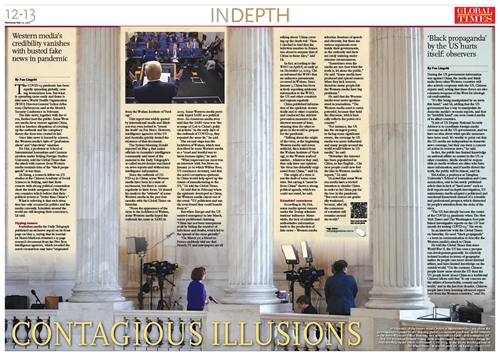
gt